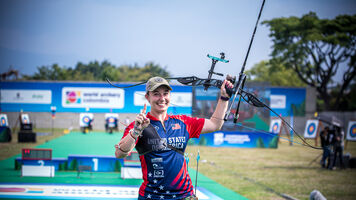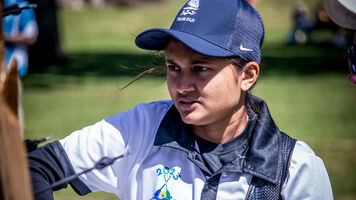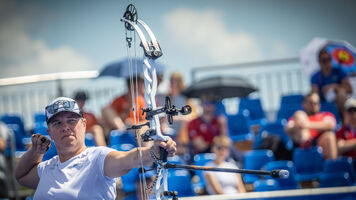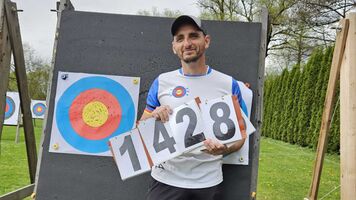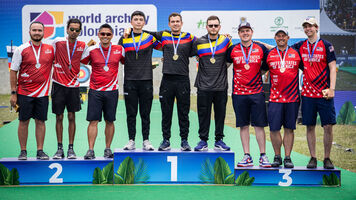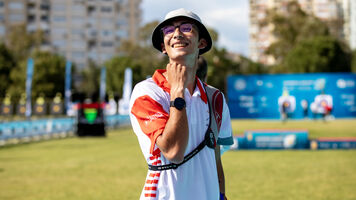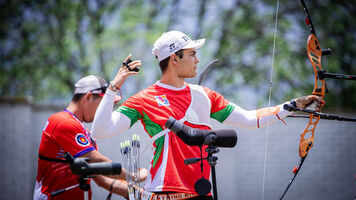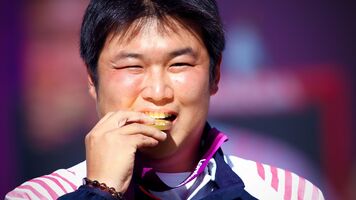This content is archived and as has not been processed. It may contain unformatted text or images, broken links or out-of-date information.
Archive
Denise PARKER (USA): “I was born to be an archer”
Ogden
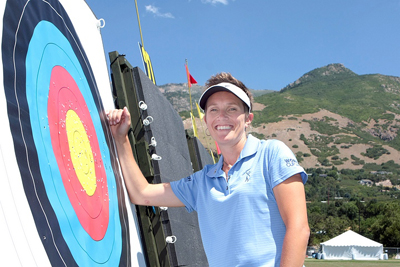 Please tell us what is your involvement here in Ogden at the Archery World Cup Stage 3?
I am involved here in two ways. Firstly, as part of the Organising Committee, I work on some areas of the public relations and the marketing effort for the event. Also as the CEO for USA Archery I am promoting the US team and USA archery. Outside of the World Cup, my job is CEO for USA archery. Our office is in Colorado Springs with the US Olympic Committee, but USA Archery agreed that I stay in Utah with my husband and two young sons and work from here. I manage our national events, team and training.
What are your goals and programmes to keep developing archery in the USA?
We are trying to build the programs back up. US archery has gone through a really tough time financially in the last five years. We are investing in coaching and junior club development. We are also trying to get funding for our team. This is the first year our team has been funded by USA Archery to compete in every World Cup event. We are trying to get back on track.
Please tell us what is your involvement here in Ogden at the Archery World Cup Stage 3?
I am involved here in two ways. Firstly, as part of the Organising Committee, I work on some areas of the public relations and the marketing effort for the event. Also as the CEO for USA Archery I am promoting the US team and USA archery. Outside of the World Cup, my job is CEO for USA archery. Our office is in Colorado Springs with the US Olympic Committee, but USA Archery agreed that I stay in Utah with my husband and two young sons and work from here. I manage our national events, team and training.
What are your goals and programmes to keep developing archery in the USA?
We are trying to build the programs back up. US archery has gone through a really tough time financially in the last five years. We are investing in coaching and junior club development. We are also trying to get funding for our team. This is the first year our team has been funded by USA Archery to compete in every World Cup event. We are trying to get back on track.
Now let’s look back on your career. How did you start archery and become aware of your special talent?
I was introduced to archery by my dad who was involved in bow hunting. At 10 years old I started to practice with him. The nearby club had a junior programme and I started shooting in it and I was pretty good (smile). At 12 I competed in my first Junior Indoor National Championships, which I won. My score was higher than the senior women’s champion. This made me realize I was pretty good. I won the Pan Am Games (individual and team) at 13 and went to my first Olympics in Seoul 1988 as the youngest member of the entire US Olympic team and our team won the bronze.
How do you explain these successes at such an early age? Crazy lucky! I don’t know, people always ask me that. Sometimes you’re gifted for certain things, I guess I was born to be an archer! I’ve always felt very lucky to be able to have that experience. How did you train at the time? Most of the time my father would coach me locally, day to day, and then I would fly to Indiana frequently to visit coach Tim STRICKLAND who lived there. I trained for some time in the Olympic Training Centre at Chula Vista in 1994 just after it opened but I liked training at home better. You competed in two more Olympic Games and retired in 2000. Did you stay involved in the sport at the time? I competed in the Barcelona 1992 and Sydney 2000 Olympics. I didn’t make the team for Atlanta, which was sad because the Olympics were held here in the US. The Sydney Games were my last competition but I stayed involved in the sport, working for Hoyt for a while. I then worked for the Archery Trade Association as vice president and I ran the ATA Trade Show. Then in 2008 I went on to work for USA Archery as the CEO, so I always stayed involved in the sport on the work side. It’s fun to work for something you like. How many people get that opportunity? At the end what is your best memory of your career? The Olympic medal. Part of the reason it meant so much is that we weren’t supposed to achieve this as a team. It was a surprise. What main differences do you see between archery in your time and now? The archers and the equipment just get better and better, more professional. People are almost doing it for a living. The presentation of the sport has improved so much. With the creation of the World Cup, the way we present our sport has become really much better, but I’m glad I don’t have to compete against the archers of today because their level is so much higher. The competitive format of archery has changed significantly over the last two decades. You started competing under the Grand FITA Round, then in 1992 the head-to-head format called the Olympic round was created. And this year we have introduced the new set system. I have mixed feelings from an archer’s perspective. I always look at golf, I still believe that the old way tells you the best shooter. From an archer’s perspective it’s hard for me to not think about that. But from the presentation and promotion perspective I think the match-play and the set system make archery more interesting because you’re always in the game. The match-play and the set system have made the game completely different; the archers that can handle the pressure emerge as champions. It’s still important to shoot well – everybody can shoot well – but it’s mostly a question of who can shoot well under pressure. It’s a completely different game. What’s the best system according to you? I think it’s more important that we develop as a sport so in my opinion it’s good that we have developed to where we are. I can’t imagine going back. It needs to continue to get better. How do you see the World Cup? I love the World Cup. I think it’s probably one of the most important things that FITA has done for this sport and it’s getting better every year. From our country’s perspective I see that archers competing in non-FITA disciplines want to come to FITA archery in order to take part in the World Cup. I see that it makes a big difference in our country and I’m sure the same happens in other countries. I think the World Cup events are cool events. They are encouraging for the athletes and for the development of the national programmes. The first Youth Olympic Games will take place later this month. What does an Olympic medallist like you think about this? I honestly have mixed feelings about it. It has been presented a little bit more like a goodwill event where the level of the competition is not the only important element. I wonder how that all is going to play, because this concept is so different from what we imagine of the Olympics, where you are shooting for your country. The idea of having a Youth Olympics is great. It will be interesting to see how it goes. We are very excited to be sending two athletes to Singapore and having representation there. Thank you Denise, is there anything else you would like to add? I want to welcome everybody here. It’s fun to have a competition almost in my backyard. For me it’s very special to have friends from so many years come to where I grew up. Vanahé ANTILLE World Archery Communication

